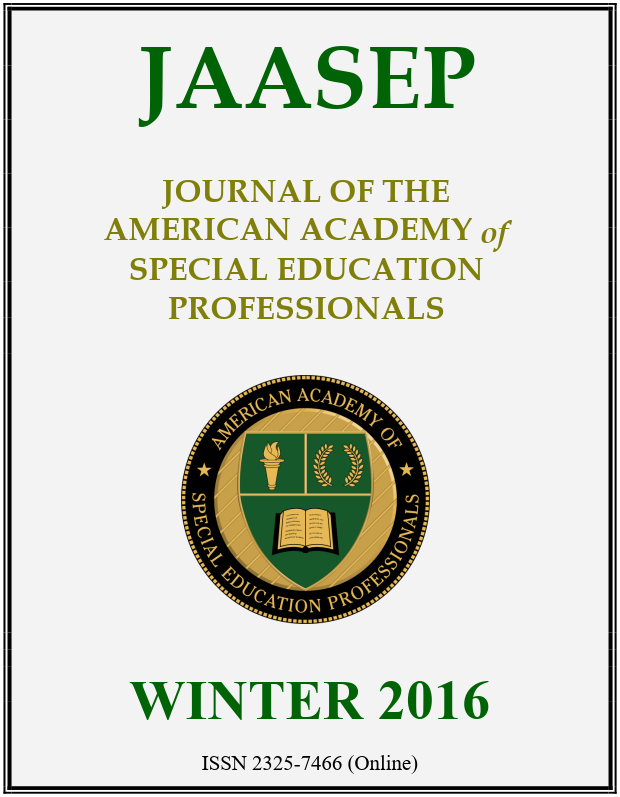The Effects of Special Education Training on Educator Efficacy in Classroom Management and Inclusive Strategy Use for Students with Autism in Inclusion Classes
Brown, J. A. & McIntosh, K. (2012). Training, inclusion, and behaviour: Effect on student-teacher and student-SEA relationships for students with autism spectrum disorders. Exceptionality Education International, 22(2), 77-88. DOI: https://doi.org/10.5206/eei.v22i2.7699
Gebbie, D., Ceglowski, D., Taylor, L., & Miels, J. (2012). The role of teacher efficacy in strengthening classroom support for preschool children with disabilities who exhibit challenging behaviors. Early Childhood Educational Journal, 40(1), 35-46. doi:10.1007/s10643-011-0486-5 DOI: https://doi.org/10.1007/s10643-011-0486-5
Kalkbrenner, A. E., Braun, J. M., Durkin, M. S., Maenner, M. J., Cunniff, C., Lee, L., Pettygrove, S., Nicholas, J. S., & Daniels, J. L. (2012). Maternal smoking during pregnancy and the prevalence of autism spectrum disorders, using data from the Autism and Developmental Disabilities Monitoring network. Environmental Health Perspectives, 12(7), 1042-1048. doi:10.1289/ehp.104556 DOI: https://doi.org/10.1289/ehp.1104556
Loreman, T., Earle, C., Sharma, U., & Forlin, C. (2007). The development of an instrument for measuring pre-service teacher’s sentiments, attitudes, and concerns about inclusive education. International Journal of Special Education, 22(2), 150-159.
Malinen, O., Savolainen, H., & Xu, J. (2012). Bejing in-service teachers’ self-efficacy and attitudes towards inclusive education. Teaching and Teacher Education 28(4), 526-534. DOI: https://doi.org/10.1016/j.tate.2011.12.004
Savolainen, H., Engelbrecht, P., Nel, M., & Malinen, P. (2012). Understanding teachers’ attitudes and self-efficacy in inclusive education: Implications for pre-service and in-service teacher education. European Journal of Special Needs Education, 27(1), 51-68. doi:10.1080/08856257.2011.613603 DOI: https://doi.org/10.1080/08856257.2011.613603
Sharma, U. Loreman, T., & Forlin, C. (2012). Measuring teacher efficacy to implement inclusive practices. Journal of Research in Special Education, 12(1), 12-21. doi:10.1111/j.1471-3802.2011.01200.x DOI: https://doi.org/10.1111/j.1471-3802.2011.01200.x
Sokal, L., & Sharma, U. (2013). Canadian in-service teachers’ concerns, efficacy, and attitudes about inclusive teaching. Exceptionality Education International 23(11), 59-71. DOI: https://doi.org/10.5206/eei.v23i1.7704
Syriopoulou-Delli, C. K., Cassimos, D. C., Tripsianis, G. L., Polychronopoulou, S. A. (2012). Teacher’s perceptions regarding the management of children with autism spectrum disorders. Journal of Autism and Developmental Disorders, 42(5), 755-768. DOI: https://doi.org/10.1007/s10803-011-1309-7
Downloads
Article Information
- Article Type Articles
- Submitted January 4, 2016
- Published February 15, 2016
- Issue Winter 2016
- Section Articles
